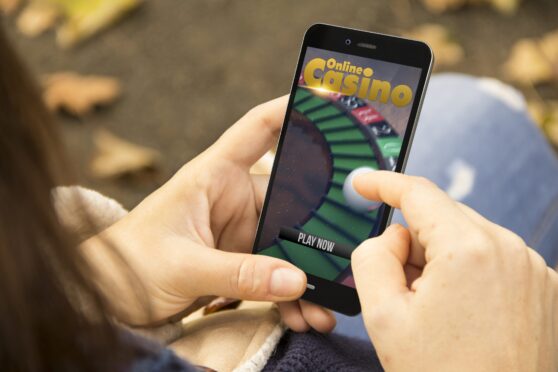
It is a shocking report that revealed the harm from problem gambling in Britain may be up to eight times worse than previously believed.
Now it has led to experts and campaigners warning more than 200,000 Scots have been impacted by what is being described as a “hidden epidemic”.
An estimated 2.5% of adults have struggled with harmful gambling, according to the first Gambling Survey for Great Britain – equating to 1.3 million problem gamblers across the UK. Previous surveys had put the figure as low as 0.3%.
Following the Gambling Commission report, conducted by the National Centre for Social Research and Glasgow University, campaigners say that the issue has been massively underestimated for years.
They are calling for a statutory levy on the gambling industry to be urgently introduced to fund better help and support services.
Thousands have serious gambling issue
In Scotland, it is believed that there are around 18,000 people with a serious gambling issue. But experts say the issue can affect up to a further 12 people around each problem gambler – including family, friends and work colleagues – meaning that around 220,000 people in Scotland could now have been touched by chronic gambling.
Maria Welsh, from gambling support charity the RCA Trust, says the numbers could be even higher than previously estimated.
“Problem gambling doesn’t just impact on the person that is doing it, many others close to them can be significantly affected too,” she said. “This includes partners, parents, children, friends and colleagues.
“Many of them suffer in silence. They can experience similar shame and distress as the problem gambler does but are often too embarrassed, or don’t know where, to seek help.
“When you consider the impact of less serious, but still harmful gambling, we would estimate around 475,000 people in Scotland could be affected. This is at epidemic levels and further help and support is needed.”
‘We need urgent action’
Kevin Stewart, MSP for Aberdeen Central, has long campaigned for a crackdown on gambling.
He has spearheaded efforts in Scotland on the issue of fixed odds betting terminals, dubbed the “crack-cocaine” of gambling, and has urged the UK government to lower the maximum bet to £2 and to ban the gaming machines from high street bookmakers.
“The fact that more than 200,000 Scots have been impacted by problem gambling is shocking but comes as no surprise,” he told The Sunday Post. “The UK government has been talking about bringing in a statutory levy on the gambling industry to help fund better support for victims but the monetary figures they are looking at are far too low. We need urgent action on this.”
Labour promised in its manifesto to reform gambling regulation and strengthen protections to reduce gambling-related harm. The Gambling Commission research found that, among those who had gambled in the past year, more than one in 40 experienced severe harm to their life, such as turning to crime to finance gambling, experiencing a relationship breakdown or losing their home.
Among men and young people, the rates were even higher. More than one in 20 of those aged 18-34 who had gambled in the last 12 months reported a severe impact on their life. Among men, 1.9% experienced a relationship breakdown, 1.9% lost something of significant financial value, such as a home, business or car, and 1.6% experienced violence or abuse.
More than one in 10 of those who responded to the survey also said they had considered suicide.
Dr Matt Gaskell, a consultant psychologist and expert in gambling harm, said that behind the latest data were “persistent and consistent stories of people exploited and harmed by the industry and the devastating impact on families, including children”.
The Scottish government said that problem gambling is a public health issue and should be treated as such. “Although gambling policy is largely reserved to the UK government, the Scottish government is developing a gambling-related harms policy for Scotland. We continue to work with UK government and Wales over the next steps following the consultation on the statutory levy earlier this year.”
I logged onto his online bank… he was losing thousands every month
Hannah Walker was raising her first baby when she discovered that her partner was a secret gambling addict who had blown a £100,000 hole in the family finances.
“I knew something had been up with him for a while because he was very low but I couldn’t put my finger on what was wrong,” she said. “Then, one night when he had gone out and had left his phone at home, I logged onto his online banking and discovered the thousands he was losing every month.
“We always had separate bank accounts. When I saw all these large payments to gambling companies I was shocked.”
Hannah said that, despite her partner earning a healthy salary, they were always scrabbling for money at the end of the month.
“I had also been lending him money and it turned out it was all to fund his secret habit,” she said. “When I confronted him, he admitted he had been gambling heavily for a while but had managed to keep it hidden because it was online, mainly on his phone.
“He basically had a casino in his pocket, and it was at his fingertips 24/7.
“Knowing I had been lied to for such a long time was difficult to come to terms with, and the financial impact was devastating.”
In 2017, the couple contacted Gamblers Anonymous and started to rebuild their finances. But her partner relapsed during a Covid lockdown and Gamstop, the free national online service that allows problem gamblers to exclude themselves from all licensed platforms, played a vital role in his subsequent recovery.
“He was buzzing because he was getting better, but I was scared and angry, and I didn’t want anyone else to know,” Hannah said. “However, us both getting help to come to terms with his addiction was the best thing that we could have done.”
Hannah, an actress from Bellingham, near Newcastle, has turned her experiences into a stage show called Gamble that she is bringing to Summerhall for the Edinburgh Fringe, from August 1-26.
It combines an hour of comedy with an hour of information on gambling harm, including workshops delivered by Dr Matt Gaskell, NHS lead on gambling addiction.
Hannah added: “It is a funny show but with a very serious point, aimed at raising awareness of a widespread, but often hidden, problem.”
GAMSTOP said: “Hannah’s bravery to turn her experience as an affected other into such a powerful, emotive show is a real testament to her and her partner. We’re proud to be able to support her and others like her with the GAMSTOP service.
“Helping those affected by gambling to exclude themselves from all online gambling with one sign up can be a lifeline for them, and their loved ones alike. We hope that Hannah being so open will rightly shine a light on ‘affected others’ – raising awareness of the wider impact of gambling harms.”
If you have a loved one with a gambling problem, support is available from:
GAMSTOP, call 0800 138 6518, “10am to 8pm, 7 days a week). Gamblers Anonymous Scotland, call 0370 050 8881 (available 24 hours). GamCare call 0808 8020 133 (seven days, 8am to midnight). BigDeal call freephone 0808 8020 133 (7 days, 8am to midnight).

Enjoy the convenience of having The Sunday Post delivered as a digital ePaper straight to your smartphone, tablet or computer.
Subscribe for only £5.49 a month and enjoy all the benefits of the printed paper as a digital replica.
Subscribe © Christa Holka
© Christa Holka